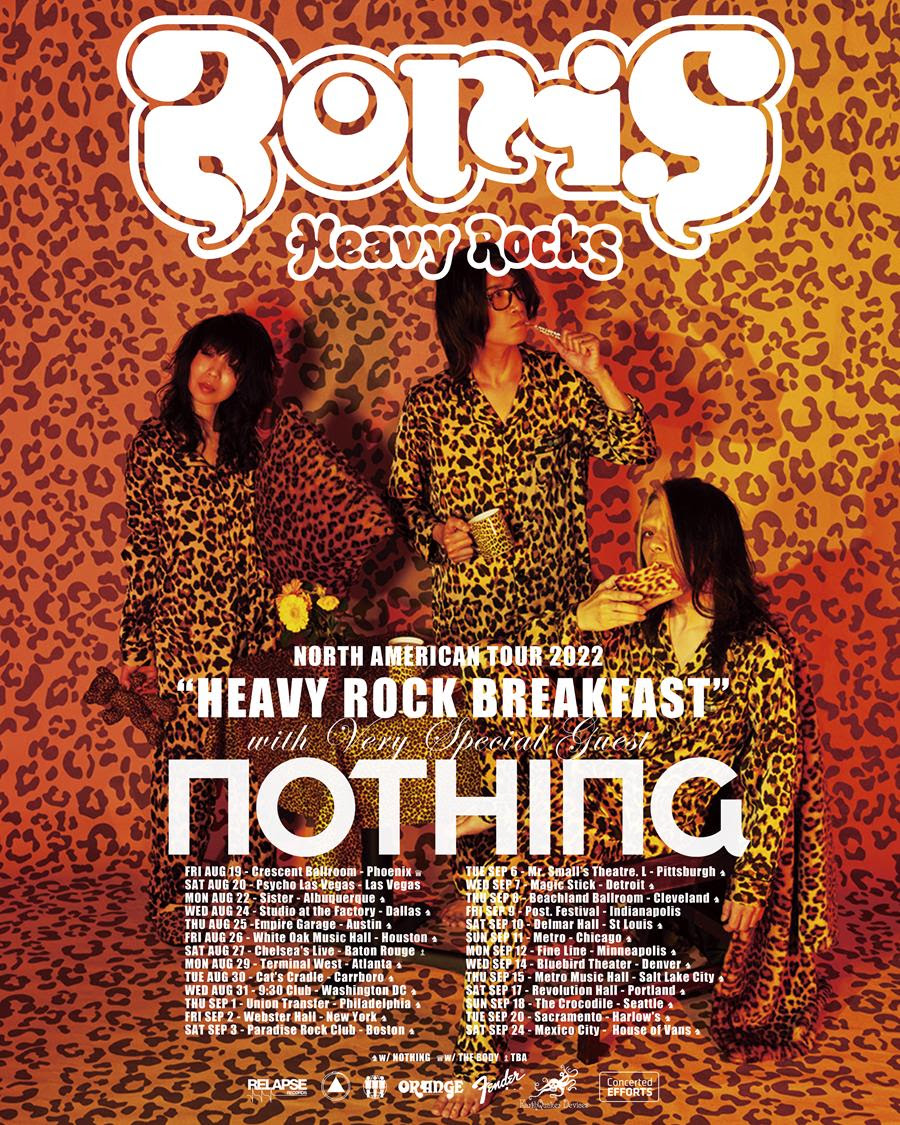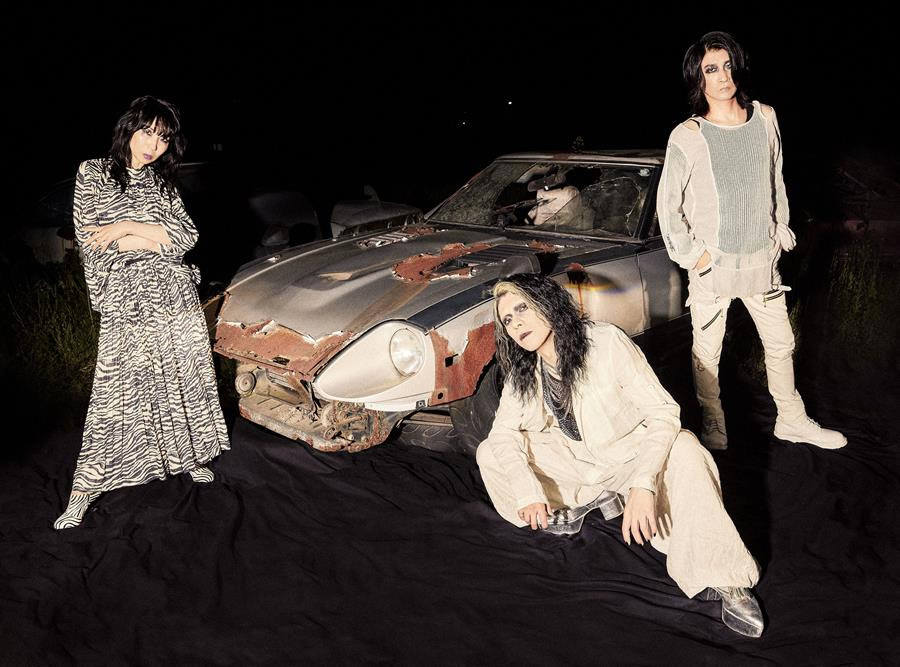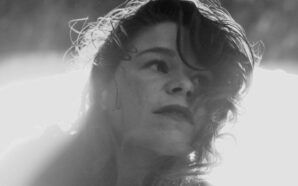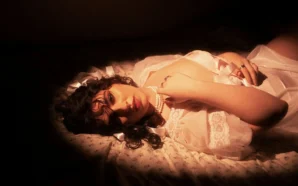Legendary Japanese experimental rockers Boris are currently celebrating their 30th anniversary, and today they released their third Heavy Rocks LP and second full-length of the year, Heavy Rocks (2022). Last week the band dropped their third single and video from the album (“My name is blank”) and later this month — after a warmup show and an appearance at this year’s Psycho Las Vegas — Boris will be hitting the road for their “Heavy Rock Breakfast” U.S. tour alongside local shoegaze legends Nothing, including a September 1st stop at Union Transfer. I recently got a chance to chat with Boris guitarist/bassist Takeshi about what the band’s been up to recently.
(Translated by Kasumi Billington)
Izzy: Since this is a Philadelphia-based publication, I have to ask your thoughts on the city. You’ve played here countless times. Any favorite memories?
Takeshi: The first time we played in Philadelphia was in 2005, with Hidden Hand at First Unitarian Church.
It was a DIY organized show that happened in the basement of a church, and it was very fun. I can’t forget how we performed at First Unitarian Church in 2008, it was a summer tour and extremely hot, and there was no air conditioning.
Within that venue, the audience moshed, so that was crazy in itself. Once the concert began, not even one minute in, we were sweating like crazy and were soaked like after a squall. We’d taped down cables with gaffer tape so they wouldn’t move, but with the humidity, the tape peeled off, and it felt like we were playing in a large sauna.
It was punk rock style, and it was really fun.
Izzy: You’re gearing up to release Heavy Rocks (2022). What can fans expect of the album? How does it compare to previous releases? Your catalogue is pretty massive.
Takeshi: We’ve released Heavy Rocks in 2002 and 2011 previously- kind of like a ten-year cycle, and this will be the third time, but Heavy Rocks isn’t just a title, rather words that represent how we live and our attitude.
We’re constantly changing, updating like we’re going up spiral stairs. The part of this large spiral cycle represents our thoughts and representation of an ideal rock figure, the latest form of heavy rock. We’d love for you to experience the Boris “now” that survived the pandemic.
Izzy: On a related note, you also released companion LPs NO and W quite recently, since the start of the pandemic. Have you had any favorite reactions to that music, from fans or live audiences?
Takeshi: Before, we’d go on tour after releasing music, we’d get to go on tour to see fans and audiences and feel their reaction directly. During the pandemic, we weren’t able to do so and to be honest, it made us feel uneasy at some points in time. But people worldwide reacted to our release of NO through bandcamp, and it made us happy that even in these difficult situations, there are people who still love music and support Boris. It increased our hopes of getting out of this situation to perform live and go on tour.
It’s no exaggeration to say that this feeling stimulated our desire to create, and how this “Heavy Rocks” was born.
Izzy: A lot of artists have told me that they spent the pandemic revisiting their record collections, so I’m curious what you were listening to a lot of during the pandemic, whether things that directly influenced your own music or not?
Takeshi: We continued to focus on recording even during the pandemic, so we listened to our music most.
Recently, to commemorate our 30th anniversary, we did a live performance of all songs from 2002’s “Heavy Rocks” that was specially organized in Japan and Australia.
We relisten to our past music and of course, I listen to my collection too, but I gain bigger influence from movies and books. Musical inspiration also arises from changes in social conditions and our own state of mind.
Izzy: You’re going to be playing Psycho Las Vegas this year, which I know you’ve played before, and which just seems like such a cool event. How excited are you to return to the festival, and are there any artists you’re especially excited to see? I absolutely love the new albums from Anika and Blackwater Holylight, and Bone Thugs-N-Harmony, Warpaint, and The Black Angels are some of my all-time favorites.
Takeshi: This will be our third time participating in Psycho Las Vegas, but I really think it’s a cool festival. Tons of metal heads fill the casino, and the atmosphere is also fun. Boris will be performing Day 2 on Saturday, but I’m hoping to see Anika and Liturgy. Suicidal Tendencies, too.
Izzy: After that you’re going to be doing a huge U.S. tour with Nothing (who are actually from here) and returning to Union Transfer. What can be expected of the live experience on this tour? I haven’t seen you since you played there in 2017.
Takeshi: I won’t say too much, but I think you’ll be surprised if you attend. It’s been three years since our last American tour, and we think of it as a celebration of the new world after the pandemic. We have a setlist prepared that you won’t become bored of, and we would love for you to look forward to it.
Izzy: I’m curious, with such a huge catalogue of music, how do you decide on which past releases you’re going to play on a given tour? Is it based on the songs that happen to be your favorites at the time, or is it more inspired by what you think your fans want to hear? Or, is it a bit of both?
Takeshi: We’ve always done new things, so we don’t perform past songs just because we ourselves want to.
The Heavy Rocks performance from the recent 30th-anniversary event is special. It was specially organized with Japan’s leading bassist TOKIE, so it was completely different from the so-called reproduced live performance. We presented the album in a new way of showing and listening to it. Of course, we do sometimes play songs from the past, but it’s because it’s relevant to the meaning of the show or the flow.
Izzy: I’m assuming you know this by now, but the neighborhood where Union Transfer is is called Eraserhood by locals, because it’s where David Lynch lived when he was in college and the neighborhood that inspired Eraserhead. Are you fans of David Lynch? And, if so, do you have any favorite works of his?
Takeshi: We’ve performed at Union Transfer multiple times, but I didn’t know it was called Eraserhood.
My favorite work by him is Twin Peaks.
Izzy: This is a two-part question. You’ve always had really amazing fashion and recently you collaborated with Blackmeans on a line of vegan leather pants. How did that collaboration come about, and what kinds of fashion tend to inspire you, whether designers or just eras or particular musical scenes?
Takeshi: Blackmeans’ owner/designer Yujiro Komatsu has been an old friend and we’ve both liked punk and hardcore, and we got to know each other through that type of scene. He used to make his own clothes and accessories and has always been a very fashionable guy.
He and I both had a period where we distanced ourselves from that scene for a while and hadn’t seen each other, but he’d always seen me be active in Boris, and I knew that he established Blackmeans and continued to sharpen his own fashion sense. We reunited with each other after 15 years or so during the pandemic through a connection, and we began our collaboration, triggered by a conversation to see if we can do something new together. Atsuo is vegan, so he’d never wear leather pants, and Blackmeans is a leather brand, so they’d never made clothes with other materials.
The vegan leather zip pants were born by fusing each other’s completely new approaches.
Whether it be music or fashion, we like things that feel new and give us stimulation.
Izzy: Finally, what’s next for Boris? You always seem to have a ton of projects in the works.
Takeshi: Aside from the production of NO and W, collaboration work, Heavy Rocks, there’s another album we made. This is the 30th anniversary, so we have some other special projects prepared.
We’ll continue to create work for our fans and audience who supported Boris throughout the pandemic and new people who will encounter Boris. Please look forward to it.
*Get your tickets here.
